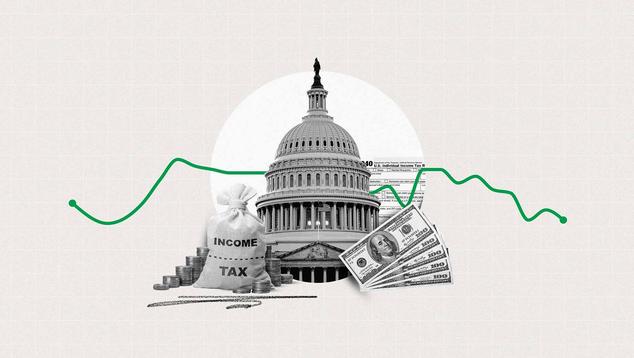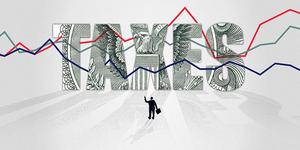Story Highlights
- 46% say the income taxes they pay are fair, one point above the 1999 low
- 59% say the amount of federal income tax they pay is too high
- New high of 58% say lower-income people pay too much in federal taxes
WASHINGTON, D.C. — Americans divide about evenly over whether the federal income taxes they pay are fair (46%) or unfair (50%). For most of the past 25 years, majorities as high as 64% have perceived their taxes as fair. But that percentage dropped to 46% in 2023 and has stayed below the majority level since then. The current figure is just one percentage point above the low point found in 1999.
These results are based on a March 3-16 poll. The decline in perceived fairness of taxes since 2022 may be tied to inflation and higher prices in recent years, and possibly Biden-era tax increases, though those primarily were limited to upper-income Americans making $400,000 or more.
Gallup first asked about federal income tax fairness during World War II, when between 85% and 90% of Americans said the income tax they were paying was fair. Once the war ended, that figure dropped to the low 60s in two 1946 polls. When Gallup revived the question in 1997, 51% of Americans viewed their taxes as fair and 43% as unfair.
Two years later, the trend low (45%) occurred during the dot-com economic boom, which helped fuel federal budget surpluses from 1998 to 2001. In 2003, as George W. Bush prepared a second round of income tax cuts following the first in 2001, the percentage of Americans who said their taxes were fair reached the recent high in the trend (64%). For the remainder of Bush’s presidency, at least 60% of Americans said their taxes were fair.
Perceptions of tax fairness fell below the 60% mark by 2010, during Barack Obama’s second year in office, but held at or above 50% until 2023.
Republicans’, Independents’ Perceptions of Fairness at Low Points
As is usually the case, Democrats are more likely than Republicans and independents to say the taxes they pay are fair. This year, 62% of Democrats, 35% of Republicans and 45% of independents hold this view. The Republican figure has been stable at 35% — the lowest for that group in Gallup’s trend — for the past three years. Independents’ perceptions also match their low point, registered previously in 1999 and 2023. Democrats were less inclined in the late 1990s and early 2000s to think their taxes were fair.
Historically, Republicans’ opinions have shifted significantly based on the incumbent president's party, while Democrats’ and independents’ views have changed less. In years since 1997 with a Republican president in office, an average of 59% of Republicans have said their taxes are fair, compared with 44% in years with a Democratic president. That 15-point difference for Republicans during Republican versus Democratic administrations contrasts with a five-point difference for independents (57% vs. 52%, respectively) and three points for Democrats (62% vs. 65%, respectively).
Political affiliation matters a lot more than personal finances when it comes to Americans’ views of taxes. There are no meaningful differences in perceptions of tax fairness among lower-, middle- and upper-income Americans.
Nearly Six in 10 Say Their Taxes Are Too High
When asked about the amount of federal income tax they have to pay, 59% of Americans say it is too high, 38% about right and 2% too low. The percentage saying their taxes are too high is near the upper end of the trend since 2003, possibly reflecting the financial squeeze felt by Americans the past few years after increased inflation and cumulatively higher prices.
Before 2003, Americans were more inclined than now to describe their taxes as too high. Between 1947, when the question was first asked, and 2001, an average of 59% of Americans expressed this view. In many of those years, more than six in 10 Americans thought their taxes were excessive, including a record-high 71% in 1952.
Republicans (71%) are currently far more likely than Democrats (39%) to say their taxes are too high, with independents’ views (63%) more in line with those of Republicans. Democrats’ opinions have been quite stable for the past 15 years, while Republicans’ dropped dramatically from 62% in 2017 to 45% in 2018, the second year of Trump’s first term, before shooting back up to 63% in 2021 after Joe Biden took office.
For the past three years, at least six in 10 independents have said their taxes are too high, after averaging 52% between 2003 and 2022.
As on the tax fairness question, perceptions of taxes being too high are similar among Americans of different income levels.
New High of 58% Say Lower-Income People Paying Too Much in Taxes
Americans generally believe that lower- and middle-income people pay too much in federal taxes and that upper-income people and corporations pay too little. Fifty-eight percent of U.S. adults say lower-income people pay too much in taxes, by one point the highest in Gallup’s trend, which dates back to 1992. This year’s figure is up from 50% last year and 41% in 2014.
Meanwhile, 30% of Americans believe lower-income people pay their fair share in taxes, and 10% say they pay too little.
Nearly as many Americans say middle-income people pay too much in taxes (54%) as say this about lower-income people. Four in 10 U.S. adults believe middle-income people pay their fair share in taxes, and 5% think they pay too little.
In the 1990s, more Americans than now thought middle-income people paid too much in taxes, ranging from 54% to 59%. But the current figure is the highest Gallup has measured since that time.
Most Americans continue to think upper-income people pay too little in taxes; however, the 58% holding this view is one of the lowest percentages Gallup has measured to date. The high was 77% in 1992 and 1993.
More Americans today (28%) than in the past say upper-income people pay their fair share in income taxes. Twelve percent say they pay too much.
Additionally, 70% of Americans believe corporations pay too little income tax, while 21% believe they pay their fair share and 7% too much. These opinions have not varied much since Gallup first asked about corporate tax levels in 2004.
Partisans Diverge on Tax Rates for Lower- and Upper-Income People
Republicans, Democrats and independents hold similar opinions on federal tax payments for middle-income Americans. Slight majorities of each party subgroup say middle-income people pay too much in federal taxes, while most of the rest say they pay their fair share.
But Republicans hold very different views than Democrats and independents do with respect to lower-income people’s federal tax payments. Roughly two-thirds of both Democrats and independents say lower-income people pay too much in taxes, compared with less than half of Republicans (43%). About as many Republicans say lower-income people pay their fair share (42%) as say they pay too much.
Republicans are most inclined to believe upper-income people pay their fair share — 48% say this, while 34% think they pay too little. In contrast, 57% of independents and 87% of Democrats think upper-income people pay too little in taxes.
Democrats (95%) are nearly unanimous in saying corporations pay too little in taxes, while 70% of independents and 48% of Republicans agree. Thirty-six percent of Republicans say corporations pay their fair share.
As with perceptions of the fairness and amount of taxes they personally pay, Americans of different income levels share similar views of the taxes paid by lower-, middle- and upper-income people.
Bottom Line
The personal income tax cuts that Donald Trump and congressional Republicans passed in 2017 are set to expire this year. Extending those tax cuts is a major policy goal for Trump and the Republican congressional majority and something they are actively trying to pass. Should the GOP successfully enact tax cut legislation, Americans’ opinions of their taxes could improve after reaching relative low points this year. However, those lower taxes could be offset by rising prices if, as many economists expect, Trump’s newly announced tariffs increase the prices Americans pay for a wide variety of products.
And while Americans may welcome a cut in their own taxes, tax cuts across the board would mostly reduce tax payments for upper-income people, who pay most of the income taxes in the U.S. Americans continue to believe that upper-income people pay too little in taxes, so it is unclear to what extent the public would support legislation that cuts taxes for high earners, as well as corporations.
To stay up to date with the latest Gallup News insights and updates, follow us on X @Gallup.
Learn more about how the Gallup Poll Social Series works.
View complete question responses and trends (PDF download).




